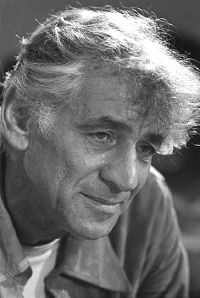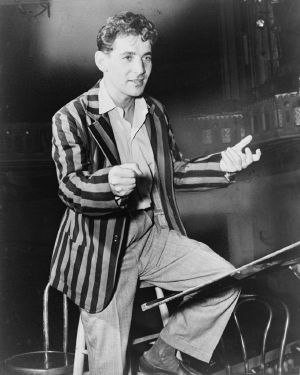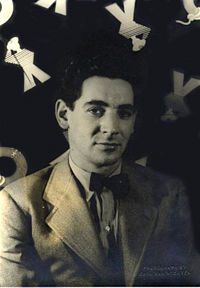Leonard Bernstein
Leonard Bernstein (pronounced "Bern-styne")[1] (August 25, 1918 – October 14, 1990) was an American composer, pianist and conductor. He was the first conductor born in the United States of America to receive world-wide acclaim, and is known for both his conducting of the New York Philharmonic, including the acclaimed Young People's Concerts series, and his multiple compositions, including West Side Story, Candide and On The Town.
Biography
Childhood
Bernstein was born in Lawrence, Massachusetts in 1918 to a Jewish family from Rovno, Ukraine. His grandmother insisted his first name be Louis, but his parents always called him Leonard, as they liked the name better. He had his name changed to Leonard officially when he was fifteen. His father, Sam Bernstein, was a businessman, and initially opposed young Leonard's interest in music. Despite this, the elder Bernstein frequently took him to orchestra concerts. At a very young age, Bernstein heard a piano performance and was immediately captivated. He began learning the piano after his Aunt Clara gave the Bernsteins her piano when she was moving due to a divorce. As a child, Bernstein attended the Garrison and Boston Latin School. When his father heard about the piano lessons he refused to pay for them, so Bernstein taught young students himself and used that income to pay for his own piano lessons.
College
After graduation from Boston Latin School in 1935 Bernstein attended Harvard University, where he studied music with Walter Piston and was briefly associated with the Harvard Glee Club. After completing his studies at Harvard he enrolled in the Curtis Institute of Music in Philadelphia, where he received the only grade of "A" that Fritz Reiner ever awarded in his class on conducting. During his time at Curtis, Bernstein also studied piano with Isabella Vengerova and Heinrich Gebhard.
Family life
Leonard Bernstein's early adult years in New York City were a whirl of hard work and much carousing. After a long internal struggle and a turbulent on-and-off engagement, he married Felicia Montealegre Cohn on September 9, 1951.
Leonard and Felicia had three children: Jamie, Alexander, and Nina. As Bernstein grew older, and as the Gay Liberation movement gained increasing momentum, he became more emboldened about expressing his bisexuality. In 1976, he left Felicia to live with companion Tom Cothran. Bernstein returned to his wife the following year. Within months of their reconciliation, however, Felicia was diagnosed with lung cancer. She died a year later, in 1978. Some claim to see a change in Bernstein's conducting after Felicia's death as more somber and heavy, more "wrung-out," with grossly elongated gestures, although others cite this as another example of the manner in which many artists exaggerate their original conducting style as they get older. Many critics consider Bernstein's later conducting performances to be the finest of his career, while others deride them as excursions into overly melodramatic and cloying sentimentality.
Career
He was highly regarded as a conductor, composer (not related to film composer Elmer Bernstein), pianist, and educator, and probably best known to the public as longtime music director of the New York Philharmonic Orchestra, for conducting concerts by many of the world's leading orchestras, and for writing the music for West Side Story. All told, he wrote three symphonies, two operas, five musicals, and numerous other pieces.
In 1940, he began his study at the Boston Symphony Orchestra's summer institute, Tanglewood, under the orchestra's conductor, Serge Koussevitzky. Bernstein later became Koussevitzky's conducting assistant.[2] He would later dedicate his Symphony No. 2 to Koussevitzky.[3]
On November 14, 1943, having recently been appointed assistant conductor of the New York Philharmonic Orchestra, he made his conducting debut when Bruno Walter was ill. He was an immediate success and became instantly famous due to the fact that the concert was nationally broadcast. The soloist on that historic day was Joseph Schuster, solo cellist of the New York Philharmonic, who played Richard Strauss's Don Quixote. Since Bernstein had never conducted the work before, Bruno Walter coached him on it prior to the concert. It is possible to hear this remarkable event thanks to a transcription recording made from the CBS radio broadcast that has since been issued on CD.
After World War II Bernstein's career on the international stage began to flourish. In 1949 he conducted the world première of the Turangalîla-Symphonie by Olivier Messiaen. After Serge Koussevitzky died in 1951, Bernstein took the position of head of the orchestral and conducting departments at Tanglewood, holding this tenure for many years.
In 1951, Bernstein conducted the Boston Symphony Orchestra in the world premiere of Charles Ives' second symphony. The composer, too old and frail to attend the concert, listened to the broadcast on the radio with his wife, Harmony. They both marveled at the enthusiastic reception of this symphony, which had actually been written between 1897 and 1901 and never performed until then. Throughout his career, Bernstein did much to popularize the music of this American composer, who died in 1954.
Bernstein was named Music Director of the New York Philharmonic in 1957 and began his tenure in that position in 1958, a post he held until 1969. He became a well-known figure in the US through his series of fifty-three televised Young People's Concerts for CBS, which grew out of his Omnibus programs that CBS aired in the early 1950s. His first Young People's Concert was televised only a few weeks after his tenure as principal conductor of the New York Philharmonic began. He became as famous for his educational work in those concerts as for his conducting. Some of his music lectures were released on records, with several of these albums winning Grammy awards. To this day, the Young People's Concerts series remains the longest running group of classical music programs ever shown on commercial television. They ran from 1958 to 1972. More than thirty years later, twenty-five of them were rebroadcast on the now-defunct cable channel Trio, and released on DVD.
In 1947 he conducted in Tel Aviv for the first time, beginning a life-long association with Israel. In 1957, he conducted the inaugural concert of the Mann Auditorium in Tel Aviv; he subsequently made many recordings there. In 1967 he conducted a concert on Mt. Scopus to commemorate the reunification of Jerusalem.
In 1959 he took the New York Philharmonic on a tour of Europe and the Soviet Union, portions of which were filmed by CBS. A major highlight of the tour was Bernstein's performance of Shostakovich's fifth symphony, in the presence of the composer, who came on stage at the end to congratulate Bernstein and the musicians. In October, when Bernstein and the orchestra returned to New York, they recorded the symphony for Columbia.
In 1960 Bernstein began the first complete recordings of all nine completed symphonies by Gustav Mahler, with the blessings of the composer's widow, Alma. The success of these recordings, along with Bernstein's concert performances, greatly revived interest in Mahler, who had once been music director of the New York Philharmonic late in his life.
In 1966 he made his debut at the Vienna State Opera conducting Verdi's Falstaff (production by Luchino Visconti, Dietrich Fischer-Dieskau as Falstaff). In 1970 he returned to the State Opera for Otto Schenk's production of Beethoven's Fidelio. In 1986 the State Opera had Bernstein conducting his A Quiet Place. Bernstein's final farewell to the State Opera happened accidentally in 1989: Following a performance of Modest Mussorgsky's Khovanchina he unexpectedly entered the stage and embraced conductor Claudio Abbado in front of a stunned, but cheering audience.
Beginning in 1970, Bernstein conducted the Vienna Philharmonic Orchestra, with which he re-recorded many of the pieces that he had previously taped with the New York Philharmonic, including sets of the complete symphonies of Beethoven, Mahler, Brahms and Schumann.
Also in 1970, Bernstein wrote and narrated a ninety-minute program filmed on location in and around Vienna, featuring the Vienna Philharmonic and such artists as Placido Domingo (in his first television appearance as one of the soloists in Beethoven's Ninth). The program, first telecast in 1970 on Austrian and British television, and then on CBS on Christmas Eve 1971, was intended as a celebration of Ludwig van Beethoven's 200th birthday. The show made extensive use of the rehearsals and finished performance of the Otto Schenk production of "Fidelio". Originally entitled Beethoven's Birthday: A Celebration in Vienna, the show, which won an Emmy, was telecast only once on U.S. non-cable television, and remained in CBS's vaults, until it resurfaced on A&E shortly after Bernstein's death - under the new title Bernstein on Beethoven: A Celebration in Vienna. It was immediately issued on VHS under that title, and in 2005 was issued on DVD.
Bernstein was invited in 1973 to the Charles Eliot Norton Chair at his alma mater, Harvard University, to deliver a series of 6 lectures on music. Borrowing the title from a Charles Ives' work, he called the series "The Unanswered Question"; it is a set of interdisciplinary lectures in which he borrows terminology from contemporary linguistics to analyze and compare musical construction to language. The lecture survives both in book and DVD form today.
In 1978, the Otto Schenk "Fidelio", with Bernstein still conducting, but featuring a different cast, was filmed by Unitel. Like the "Bernstein on Beethoven" program, it also was shown on A&E after his death and subsequently issued on VHS, though the video has since long been out-of-print, and there is no sign yet of a DVD release.
In 1979 Bernstein conducted the Berlin Philharmonic Orchestra for the first and only time, in two charity concerts. The performance, of Mahler's Ninth Symphony, was broadcast on radio, and posthmously released on CD.
He received the Kennedy Center Honors award in 1980.
On PBS in the 1980s, he was the conductor and commentator for a special series on Beethoven's music, which featured the Vienna Philharmonic playing all nine Beethoven symphonies, several of his overtures, and the Missa Solemnis. Actor Maximilian Schell was also featured on the program, reading from Beethoven's letters.
On Christmas Day, 25 December 1989, Bernstein conducted Beethoven's Symphony No. 9 in East Berlin's Schauspielhaus (Playhouse) as part of a celebration of the fall of the Berlin Wall. The concert was broadcast live in more than twenty countries to an estimated audience of 100 million people. For the occasion, Bernstein reworded Friedrich Schiller's text of the Ode to Joy, substituting the word "freedom" (Freiheit) for "joy" (Freude).[4] "I'm sure that Beethoven would have given us his blessing", said Bernstein.
Bernstein was a highly-regarded conductor among many musicians, in particular the members of the Vienna Philharmonic Orchestra (of which he was an honorary member), the London Symphony Orchestra (whose members voted him Conductor Laureate) and the Israel Philharmonic Orchestra, of which he was a regular guest conductor. He was considered especially accomplished with the works of Gustav Mahler, Aaron Copland, Johannes Brahms, Dmitri Shostakovich, George Gershwin (especially the Rhapsody in Blue and An American in Paris), and of course with the performances of his own works. (Unfortunately, Bernstein never conducted performances of Gershwin's Piano Concerto in F, nor did he ever conduct Porgy and Bess.) He had a gift for rehearsing an entire Mahler symphony by acting out every phrase for the orchestra to convey the precise meaning, and of emitting a vocal manifestation of the effect required, with a subtly professional ear that missed nothing.
Leonard Bernstein died just five days after retiring. He conducted his final performance at Tanglewood on August 19, 1990, with the Boston Symphony playing Britten's "Four Sea Interludes" and Beethoven's Seventh Symphony. [1] The concert was later issued on CD by Deutsche Grammophon. A longtime heavy smoker, he had battled emphysema from his mid-20s; he suffered a coughing fit in the middle of the Beethoven performance which almost caused the concert to break down.Bernstein is buried in Green-Wood Cemetery, Brooklyn, New York.
Recordings
Bernstein recorded extensively from the 1950s through the 1980s. Aside from a few early recordings for RCA Victor, Bernstein recorded primarily for Columbia, especially when he was music director of the New York Philharmonic. Many of these performances have been digitally remastered and reissued by Sony as part of the "Bernstein Century" series. When Columbia lost interest in American classical recordings, Bernstein signed an exclusive contract with Deutsche Grammophon that continued until his death.
Awards and recognitions
- Grammy Award for Best Album for Children
- Grammy Award for Best Orchestral Performance
- Grammy Award for Best Choral Performance
- Grammy Award for Best Opera Recording
- Grammy Award for Best Classical Vocal Performance
- Grammy Award for Best Instrumental Soloist(s) Performance (with orchestra)
- Grammy Award for Best Classical Contemporary Composition
- Grammy Award for Best Classical Album
- Tony Award for Best Original Score
Principal works with first performance dates
Works for the theater
- Fancy Free (ballet), 1944
- On the Town (Musical), 1944
- Facsimile (ballet), 1946
- Peter Pan (songs, incidental music), 1950
- Trouble in Tahiti (opera in one act), 1952
- Wonderful Town (musical), 1953
- On the Waterfront (film score), 1954
- The Lark (incidental music), 1955
- Candide (operetta), 1956 (new libretto in 1973, operetta revised in 1989)
- West Side Story (musical), 1957
- The Firstborn (incidental music), 1958
- Mass (theatre piece for singers, players and dancers), 1971
- Dybbuk (ballet), 1974
- 1600 Pennsylvania Avenue, 1976
- A Quiet Place (opera in two acts), 1983
- The Race to Urga (musical), 1987
Orchestral works for the concert hall
- Symphony No. 1, Jeremiah, 1942
- Fancy Free and Three Dance Variations from "Fancy Free,", concert premiere 1946
- Three Dance Episodes from "On the Town," concert premiere 1947
- Symphony No. 2, The Age of Anxiety, (after W. H. Auden) for Piano and Orchestra, 1949 (revised in 1965)
- Serenade (after Plato's "Symposium") for Solo Violin, Strings, Harp and Percussion, 1954
- Prelude, Fugue and Riffs for Solo Clarinet and Jazz Ensemble, 1949
- Symphonic Suite from "On the Waterfront", 1955
- Symphonic Dances from "West Side Story", 1961
- Symphony No. 3, Kaddish, for Orchestra, Mixed Chorus, Boys' Choir, Speaker and Soprano Solo, 1963 (revised in 1977)
- Dybbuk, Suites No. 1 and 2 for Orchestra, concert premieres 1975
- Songfest: A Cycle of American Poems for Six Singers and Orchestra, 1977
- Three Meditations from "Mass" for Violoncello and Orchestra, 1977
- Slava!: A Political Overture for Orchestra, 1977
- Divertimento for Orchestra, 1980
- Halil, nocturne for Solo Flute, Piccolo, Alto Flute, Percussion, Harp and Strings, 1981
- Concerto for Orchestra, 1989 (Originally "Jubilee Games from 1986, revised in 1989)
Choral music for church or synagogue
- Hashkiveinu for Solo Tenor, Mixed Chorus and Organ, 1945
- Missa Brevis for Mixed Chorus and Countertenor Solo, with Percussion, 1988
- Chichester Psalms for Countertenor, Mixed Chorus, Organ, Harp and Percussion, 1965
Chamber music
- Sonata for Clarinet and Piano, 1939
- Brass Music, 1959
- Dance Suite, 1988
Vocal music
- I Hate Music: A cycle of Five Kids Songs for Soprano and Piano, 1943
- La Bonne Cuisine: Four Recipes for Voice and Piano, 1948
- Arias and Barcarolles for Mezzo-Soprano, Baritone and Piano four-hands, 1988
- A Song Album, 1988
Other music
- Various piano pieces
- Other occasional works, written as gifts and other forms of memorial and tribute
- "The Skin of Our Teeth": An aborted work from which Bernstein took material to use in his "Chichester Psalms"
Books
By Bernstein
- Findings. New York: Simon and Schuster, 1982. New York: Anchor Books, 1993. ISBN 0-385-42437-X.
- The Infinite Variety of Music. New York: Simon and Schuster, 1966. New York: Anchor Books, 1993. ISBN 0-385-42438-8.
- The Joy of Music. 1959. Pompton Plains, New Jersey: Amadeus Press, 2004. ISBN 1-57467-104-9.
- The Unanswered Question. Cambridge, Mass: Harvard University Press, 1976. ISBN 0-674-92000-7.
About or dealing with Bernstein
- Burton, Humphrey. Leonard Bernstein. Doubleday, 1994. Hardcover: ISBN 0-385-42345-4, Softcover: ISBN 0-385-42352-7. (Excellent and comprehensive biography of Bernstein)
- Gottlieb, Jack, editor. Leonard Bernstein's Young People's Concerts. Revised edition. New York: Anchor Books, 1992. ISBN 0-385-42435-3.
In Popular Culture
- The Seinfeld Character "Maestro" often refers to ideas that he learned from Leonard Bernstein.
Quotes
- Speaking to composer Ned Rorem: "The trouble with you and me, Ned, is that we want everyone in the world to personally love us, and of course that's impossible: you just don't meet everyone in the world"[5]
ReferencesISBN links support NWE through referral fees
- ↑ Karlin, Fred. Listening to Movies. New York City: Schirmer., 1994., p. 264. Cf. Bernstein's pronunciation of his own name as he introduces his Peter and the Wolf recording
- ↑ About Bernstein, The Leonard Bernstein Office, Inc.
- ↑ Sony Classical biography on Leonard Bernstein
- ↑ Naxos (2006). Ode To Freedom - Beethoven: Symphony No. 9 (NTSC). Naxos.com Classical Music Catalogue. Retrieved 2006-11-26. This is the publisher's catalogue entry for a DVD of Bernstein's Christmas 1989 "Ode to Freedom" concert.
- ↑ The Paris Diary of Ned Rorem, quoted in Norman Lebrecht, The Book of Musical Anecdotes
External links
- Official Site
- Leonard Bernstein discography at MusicBrainz
- Obituary, NY Times, October 15, 1990
- Bernstein at the Library of Congress
- Bernstein at Sony Music
- Bernstein's Boston, a Harvard University research project
- Radical Chic, a book by Tom Wolfe describing a gathering at Bernstein's apartment of New York's social elite and the Black Panther Party.
- Discography
- Leonard Bernstein: A Total Embrace of Music, written by Peter Gutmann, music journalist.
- Arias and Barcarolles, The Leonard Bernstein Pages
| Preceded by: Dmitri Mitropoulos |
Music Director, New York Philharmonic 1958–1969 |
Succeeded by: George Szell |
ca:Leonard Bernstein cs:Leonard Bernstein cy:Leonard Bernstein da:Leonard Bernstein de:Leonard Bernstein es:Leonard Bernstein fr:Leonard Bernstein ko:레너드 번스타인 hr:Leonard Bernstein it:Leonard Bernstein he:ליאונרד ברנשטיין ka:ბერნსტაინი, ლეონარდ lt:Leonardas Bernstainas nl:Leonard Bernstein ja:レナード・バーンスタイン pl:Leonard Bernstein pt:Leonard Bernstein ru:Бернстайн, Леонард simple:Leonard Bernstein sk:Leonard Bernstein sl:Leonard Bernstein fi:Leonard Bernstein sv:Leonard Bernstein zh:伦纳德·伯恩斯坦



